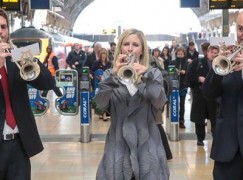Alison Balsom quits festival job
mainThe trumpet star has quietly relinquished her position as artistic director at the Cheltenham Festival.
The PR wording is more than usually cart-before horse:
Cheltenham Festivals is delighted to announce that Jules Buckley has been appointed as the first Guest Curator for Cheltenham Music Festival from 2020. The composer, orchestrator and conductor has made a name for himself as one the most in-demand conductors and arrangers of contemporary orchestral projects. Currently he is Musical Director of the UK’s Heritage Orchestra and Chief Conductor of Holland’s renowned Metropole Orkest, with whom he won a Grammy Award for Sylva, their collaboration with Snarky Puppy. He has curated several BBC Late Night Proms including performing with Quincy Jones in a tribute to his musical idol.
Jules Buckley will work alongside Cheltenham Music Festival’s Head of Programming to devise the 2020 Festival programme. He said: “It is so exciting to be involved in Cheltenham Music Festival for next year as Guest Curator. I’m looking forward to working with the team on delivering some truly unique experiences at one of the country’s most renowned classical music festivals.”
Following an enormously successful 75th anniversary Festival, Alison Balsom OBE steps down as Artistic Director to focus on her international performing and recording career. Appointed in early 2018, Alison Balsom has long been recognised as a champion of broadening audiences for classical music and for wider participation in music making. These shared values with Cheltenham Music Festival resulted in her programming for the Festival’s 75th anniversary with 20 world premieres and year-round outreach work.







Didn’t stay long
A tremendous loss and blow to the hapless Cheltenham Festival. Alison was a tremendous catch to a Festival who do not value Classical Music and audiences will regret her departure. This is yet another example, (like the BBC Proms) of dumbing down programming to the common denominator, who may or may not support the future popular Cheltenham programming.
But they’re also getting Camilla King as Head of Programming – a tremendous boon for the so-called ‘hapless’ Cheltenham Festival.
Have you actually seen the Cheltenham programme? 11 world premieres; and music by Gipps, Knussen, Saariaho, Bryars, MacMillan, Edmund Finnis, Per Norgard, Lili Boulanger, Karin Rehnqvist, Oliver Knussen, Barbara Strozzi, William Bolcom, Ives, Panufnik, Sigurbjornsson…
There’s not the remotest trace of “dumbing down”.
Like I said in my longer comment below, I think the standards were variable (and that is based on hearing concerts that had looked interesting). The presence of some inspired programming (concentrated in relatively few concerts) does not preclude “dumbing down” elsewhere.
And, for the record, the Gipps work was pulled from the programme of the relevant concert, due to a short-notice change of conductor. The replacement conductor, Edward Gardner, also altered the Walton work in that concert, substituting the 1st Symphony for the Trolius and Cressida Suite. The remaining two works were as advertised: the Musgrave Trumpet Concerto (world première), with Balsom as soloist; and the VW Tallis Fantasia. I suppose the need for changes to that concert occasioned by the change of conductor are attributable precisely to the innovative programming (definitely *not* “dumbing down”) — of the four works originally planned, only the VW Tallis Fantasia is “standard rep”. Anyhow, that concert was excellent, so no complaints.
11 world premieres? So? 11 new pieces of music, written no doubt by composers nobody has ever heard of, and probably sat out in the bar by most. When did you last hear a ‘world premiere’ that a) you wanted to hear again, b) couldn’t most profitably be consigned to the WPB of history?
Music from composers you quote, half of whom nobody has ever heard of either, and hardly likely to appeal to the average festival goer. There’s little understanding among the programmers about what interests audiences, and when you combine the poor programming withe the awful venues and piratical seat pricing, the question is how long the festival can continue.
Maybe not such a terrible blow. It’s clear that she had nothing much to contribute, or at least nothing that was wanted by the festival grandees. The reality is that she was only appointed in the first place to lend a note of youth and glamour, in the hope of attracting more young people to festival events. Never a suitable choice in the first place and, from the start, we never thought she’d stay.
The festival management haven’t done themselves any favours with the ridiculous piece of spin they’ve put out, trying to make it look as if it were all planned this way! Heaven knows what musical absurdities will be imposed if the new guy is allowed to have his way …
Really, without a proper concert venue, this festival doesn’t have a lot going for it. Unlikely to change in the foreseeable future.
Alison Balsom is not a stayer, so far
Awfully reassuring to know the new guy has collaborated with Snarky Puppy. Really has revived my hopes for the future of classical music in the U.K.
Should be good for a few rounds of self-congratulatory salvos on social media.
This is old news – if you recall we knew about it on 8 March … the Cheltenham Fest have merely decided to keep it quiet until the festival was underway to avoid embarrassment.
I went to some of this year’s Cheltenham Festival during the “opening weekend” (Friday 5th–Sunday 7th July). Based on the events I attended, the artistic standard was variable: some of the performances were excellent (the Nash Ensemble’s concert, as well as the CBSO concert with a wonderfully paced VW Tallis Fantasia, an electrifying Walton 1st Symphony, and Balsom as soloist in a new concerto by Thea Musgrave… all the more remarkable for the fact that the conductor, Edward Gardner, was stepping-in at short notice), some were inspired ideas that were certainly very good but did not emerge as excellent on the day (the Shostakovich 8th quartet preceded by a dramatised reading of relevant source material and contextual stories), whilst some others were disappointing (the first half of the LSO’s concert was shockingly mediocre compared with the usual standards I have come to expect — too sluggish and failed to project… I suspect the conductor, Elim Chan, was to blame).
But what really struck me about the festival was that the amplified music coming from the bandstand in the Imperial Gardens was so loud that it leaked into the Town Hall, disrupting the events taking place in the latter. To me, that suggests dysfunctional organisation, or a case of “one hand not knowing what the other is doing”.
More generally, I am left wondering how much oversight Balsom exercised *personally* in deciding the programmes and setup, and how much she simply rubber-stamped (and yes, there are festivals where the artistic director really does take personal responsibility for selecting *every* performer and every work, although such festivals tend to be rather smaller in scale… the example that springs to my mind is the Leicester International Music Festival, which I attended in 2018, and found almost invariably outstanding — it comprised a series of half-a-dozen events over three days in September curated in every detail by Nicholas Daniel).
Snarky Puppy? FFS …